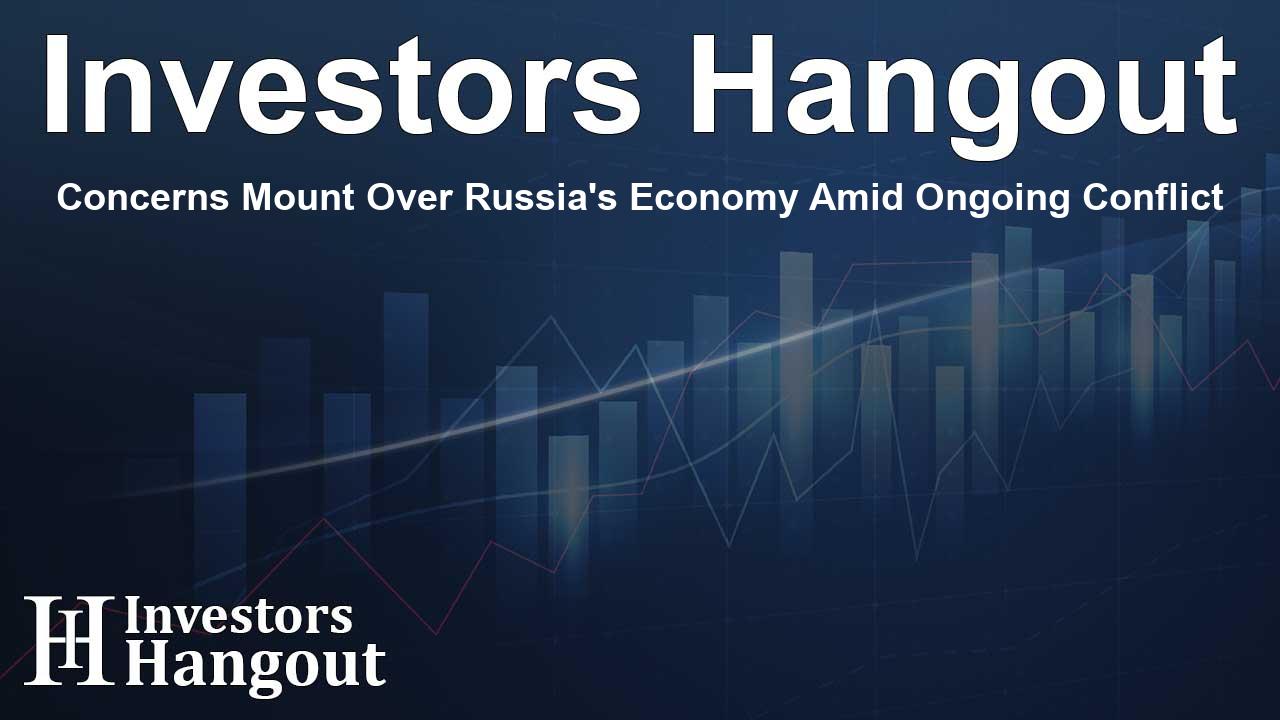Concerns Mount Over Russia's Economy Amid Ongoing Conflict

Putin's Growing Concerns About the Russian Economy
President Vladimir Putin is increasingly troubled by the state of Russia's wartime economy. This sentiment arises as Donald Trump expresses a desire to end the ongoing conflict in Ukraine. Insights from various knowledgeable sources indicate that the war has significantly impacted Russia's economy, traditionally reliant on oil, gas, and mineral exports.
Current Economic Status in Russia
Despite the sanctions imposed after the invasion of Ukraine, Russia's economy had shown robust growth over the past two years. However, recent months have painted a different picture. Strains such as labor shortages and rising interest rates aimed at controlling inflation have taken a toll.
The situation has prompted discussions among some within Russia’s elite about the need for a negotiated resolution to the war. Economic distortions caused by excessive military spending have raised concerns about sustainability, as expressed by Oleg Vyugin, a former deputy governor of the Central Bank of Russia.
Trump's Approach to the Ukraine Conflict
With Trump back in office, he aims to address the conflict swiftly. He has indicated that new sanctions and tariffs may be imposed on Russia unless negotiations occur. Putin reportedly perceives the necessity to stabilize the economy amid these threats, as he faces pressure to ensure long-term growth.
Putin's previous comments have hinted at a readiness to explore ceasefire options, although he insists on preserving certain territorial gains made during the conflict. His steadfastness is evident in his assertions that Russia's interests will not be compromised.
Economic Predictions and Challenges Ahead
Despite forecasts of economic growth for Russia, there is an expectation of diminished prospects in the near future. The International Monetary Fund and the central bank are predicting subdued growth rates, which contrasts with earlier optimism regarding the resilience of the Russian economy.
Inflation has become a pressing issue, inching closer to double-digit figures, while interest rates have soared, complicating efforts to stimulate economic activity. During a recent conference, Putin acknowledged the challenges, stressing the need for the government and the central bank to address rising temperatures in the economy.
Substantial Military Spending Effects
Military efforts have drastically increased spending, accounting for a significant portion of the national budget. This has not only affected defense capabilities but has also created inflationary pressures that affect all sectors of the economy.
Moreover, the high-interest rates pose additional challenges for non-military businesses as evidenced by the restructuring announcements from leaders in the industrial sector due to mounting pressures from financing costs.
The Political Landscape and Economic Outlook
Putin's discontent was palpable during a recent meeting with prominent business leaders, where discussions revolved around dwindling private investment partly attributed to costly credit conditions. Despite his public praises for the business community, internal communications reveal significant concerns about economic policy impacts.
As political dynamics shift, the relationship between military expenditure and economic health remains a fundamental concern for Russian authorities. Long-term growth relies heavily on the ability to balance spending without stifling economic activity.
Business Leaders' Reactions
Many influential business figures have also voiced opinions on the high-interest rates and the future implications for Russia’s economic stability. The consensus is that continued high rates could precipitate stagnation, an alarming prospect for those with vested interests in Russia’s financial landscape.
Nabiullina's Role in Economic Strategy
Elvira Nabiullina, the central bank governor, has been a prominent figure in navigating these turbulent economic waters. Appointed for a third term shortly after the onset of the conflict, she is tasked with maintaining stability amid soaring inflation rates and geopolitical tensions.
Supporters argue that her leadership is crucial in managing the underlying inflation caused by extensive military spending. Yet, discussions surrounding her future position are ongoing, with some lawmakers calling for a change, although analysts believe her removal would not be in the country's best interest.
Frequently Asked Questions
What are Putin's main concerns regarding the economy?
Putin is worried about economic distortions caused by military spending and challenges such as inflation and labor shortages.
How has recent military spending impacted Russia's economy?
The increased military expenditures have strained the economy, leading to inflation and hindering investment in civilian sectors.
What is Trump's stance on the Ukraine conflict?
Trump seeks to resolve the Ukraine conflict quickly and has hinted at more sanctions against Russia unless negotiations proceed.
What are the economic growth forecasts for Russia?
Growth forecasts for Russia are subdued, with expectations of under 1.5% growth due to various economic challenges.
What role does Nabiullina play in managing the economy?
Nabiullina oversees the central bank and is responsible for implementing monetary policies to stabilize the economy amid ongoing pressures.
About The Author
Contact Ryan Hughes privately here. Or send an email with ATTN: Ryan Hughes as the subject to contact@investorshangout.com.
About Investors Hangout
Investors Hangout is a leading online stock forum for financial discussion and learning, offering a wide range of free tools and resources. It draws in traders of all levels, who exchange market knowledge, investigate trading tactics, and keep an eye on industry developments in real time. Featuring financial articles, stock message boards, quotes, charts, company profiles, and live news updates. Through cooperative learning and a wealth of informational resources, it helps users from novices creating their first portfolios to experts honing their techniques. Join Investors Hangout today: https://investorshangout.com/
The content of this article is based on factual, publicly available information and does not represent legal, financial, or investment advice. Investors Hangout does not offer financial advice, and the author is not a licensed financial advisor. Consult a qualified advisor before making any financial or investment decisions based on this article. This article should not be considered advice to purchase, sell, or hold any securities or other investments. If any of the material provided here is inaccurate, please contact us for corrections.
